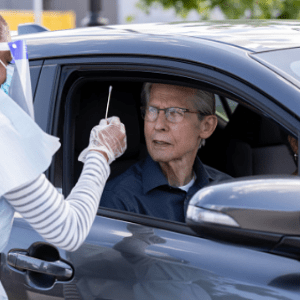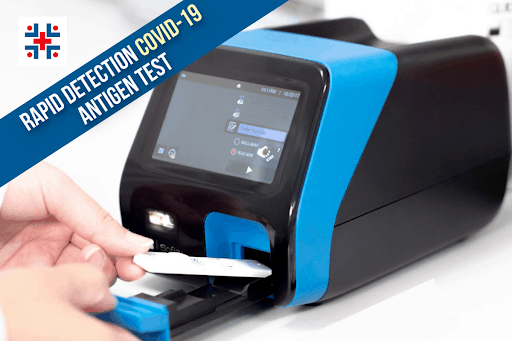Table of Contents
- What is an Antigen Test?
- What Are the Types of COVID-19 or Coronavirus Tests?
- How Does The Antigen Test Work?
- What is an EUA?
- What Are The Signs or Symptoms of COVID-19?
- Should I Take a COVID-19 Antigen Test?

What is an Antigen Test?
An antigen test collects a respiratory specimen sample from a nasal swab where the protein fragments are then detected and analyzed to help in the rapid detection of the virus that causes COVID-19. Recently, the FDA, or U.S. Food and Drug Administration, authorized the first antigen test which gives automated results within 15 minutes. With an emergency use authorization or EUA, Direct Med Clinic now has another point-of-care testing device to assist the San Antonio community during the Coronavirus pandemic.
The FDA is a branch of the U.S. Department of Health and Human Services that assist in public health by “assuring the safety, effectiveness, and security of human and veterinary drugs, vaccines and other biological products for human use, and medical devices.”
This COVID-19 antigen test falls into a new category of tests currently being used while officials continue to grapple with the best way to lessen community spread in San Antonio. According to the FDA, “Antigen tests will play a critical role in the fight against COVID-19…while balancing the urgent need for these critical diagnostics.”
What Are the Types of COVID-19 or Coronavirus Tests?
Direct Med Clinic has responded to the COVID-19 pandemic by using diagnostic tests that were both serological (antibody tests) and molecular tests (PCR). The PCR, or polymerase chain reaction test, detect genetic material from the virus which is useful in helping to diagnose an active COVID-19 infection. Antibody tests are serological tests for COVID-19 searching for antibodies of the virus, or specific proteins, that are produced in response to infections. They do not test for the active COVID-19 infection but can still help to identify who has been exposed and subsequently developed a response to the virus. Direct Med Clinic healthcare providers determine which test to use on a patient based on a combination of patient history, risk, exposure, and other clinical analysis. A negative result does not rule out an infection. A negative antibody test may be followed-up with a PCR test for a symptomatic patient who has had known exposure, for example.
How Does The Antigen Test Work?
The virus that causes COVID has proteins that can be detected through a small, handheld machine that works by collecting respiratory specimens using nasal swab samples. The antigen test analyzes the proteins within 15-minutes. Antigen tests do not work the same way as a PCR test or rule out infection, however, antigen tests are still important in the overall response against COVID-19 as they can “potentially scale to test millions of Americans per day due to their simpler design, helping our country better identify infection rates closer to real-time.
What is an EUA?
An EUA is a medical device or test made available under an Emergency Use Authorization (EUA), which is federally recognized and approved for use to diagnose, treat or care for serious disease or illness during a national emergency. During the Coronavirus public health emergency, the United States FDA has issued an EUA for the antigen test that Direct Med Clinic uses. The EUA is supported by the Secretary of Health and Human Services (HHS) for the duration of the public health emergency. However, due to the severity of illness that the virus causing COVID-19 can have on patients, the EUA is justified while waiting for approval of use during non-emergency times.
Direct Med Clinic practitioners consider the patient’s status, symptoms, and previous relationship to determine the diagnostic tool that is the most suitable to perform on a Direct Med Clinic patient in fighting against COVID. Direct Med Clinic uses the finger-stick whole blood test (15-minute antibody test), PCR test, and an antigen test. Some are used in combination with other tests to proceed to the next step in taking care of a patient. PCR tests are preferred for their accuracy, however, the turnaround for COVID-19 results often takes time due to sending off the sample to a special laboratory, waiting to run and analyze results.
What Are The Signs or Symptoms of COVID-19?
Patients may exhibit symptoms such as fever, cough, difficulty breathing, or other signs that occur in the beginning phases of the virus. Although the antigen test is not as sensitive as the molecular tests or PCR test, Direct Med Clinic practitioners can make informed recommendations to patients that can include combining the PCR test to detect active COVID-19 disease. The antigen test can help practitioners to better make informed decisions and recommendations for the patient about their care that can help limit the spread of COVID-19 to the workplace and to the family of the patient.
Fact Sheet for Patients – Sofia SARS Antigen FIA
Should I Take a COVID-19 Antigen Test?
The best person to determine what kind of test to scan for coronavirus disease is a healthcare provider. COVID-19 suggests that symptoms include cough, shortness of breath or difficulty breathing, fever, chills, muscle pain, headache, sore throat, or new loss of taste or smell. The antigen test is a new diagnostic test that will help patients and doctors gain speed, as results are provided in minutes. For employers who want to send their employees back to work, the turnaround time may be shortened from several days to several minutes! Direct Med Clinic is happy to accelerate the time to help patients in real-time. Since the machine can also test for Influenza A and B, this rapid detection can help make a determination for what comes next during these uncertain times.
For the most up to date information on COVID19 please visit the CDC Coronavirus Disease 2019 (COVID-19) webpage: https://www.cdc.gov/COVID19


Recent Comments